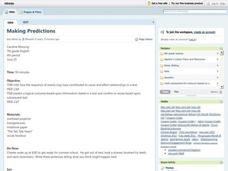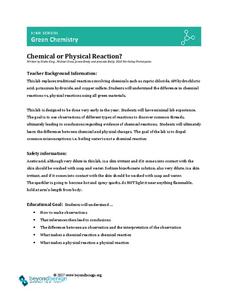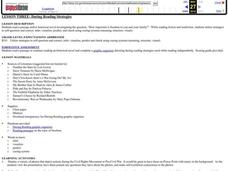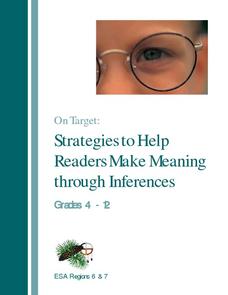Polk Bros Foundation
I Can Infer Predictions Based on an Analysis of Motive
Use a character or person's motivation as the basis for a prediction of that character or person's next action. Pupils select an individual from their reading, copy a quote, write down an inference about that character's motives, and...
Curated OER
Sequence, Predict, Infer: Pink and Say
Practice sequencing with your 2nd graders via Patricia Polacco's Civil War book Pink and Say. Begin with a blindfold and a bag of mystery items. Connect their use of clues to identify what they can't see with the skill of making...
Ohio Department of Education
Observe Then Infer
To develop their skill at drawing inferences from observations, sixth graders rotate through six stations, conduct a series of experiments, make observations, and draw inference from what they observe.
American Physiological Society
Did I Observe it or Infer it?
Take the mystery out of inquiry! When young scientists learn to use their keen powers of observation to make smart inferences about a situation, they are well on their way to understanding what the scientific method is all about. Using...
Have Fun Teaching
Predict and Infer (22)
Encourage close reading and critical thinking with a instructional activity that asks readers to select an event from a story, predict what they believe will happen, and list clues from the story that support this prediction. After...
Curated OER
Reading Comprehension 5: Level 8
Why is an atlas called an atlas? Because it is named for the Greek Titan, Atlas, of course. Young readers learn all about Atlas and atlases in a short passage used as the basis of a reading comprehension exercise. After responding to...
Curated OER
Reading Comprehension 1: Level 11
Here’s a reading comprehension assessment that will capture the interest of your learners. Stink bugs and the danger they pose to farmers is the subject of the passage, while the eight questions ask readers to infer, predict, summarize...
Polk Bros Foundation
I Can Infer Motive and Effects for an Action
Help your pupils determine just what makes a character or person tick by zooming in on one character or person. This graphic organizer is dedicated to analyzing one person and asks pupils to infer a personality trait, note down an action...
Have Fun Teaching
Growing Seeds (9)
A seed, water, and sunlight. A seed, water, but no sunlight. A seed, sunlight, but no water. Young biologists are ask to infer what will happen to seeds given five different growing conditions.
Curated OER
Making Predictions
Seventh graders read stories, stopping periodically to make predictions. They discuss how the sequence of events, as well as cause and effect, can give hints to the outcome of the story. In addition, 7th graders use logic and...
Have Fun Teaching
You Make the Call (10)
What will happen next? Young writers plot what will happen next after studying the clues in four story starters.
Beyond Benign
Chemical or Physical Reaction?
Ready to take your chemistry class on its first big lab adventure? Dive in to differentiation between chemical and physical changes with a thoughtfully designed set of experiments! Partners conduct a series of reactions, describe their...
C-SPAN
Choice Board: Expressed and Implied Powers
Article 1, Section 8 of the United States Constitution expressly lists powers given to Congress. Over the years, lawmakers have expanded the enumerated powers to include powers implied by the list. To better understand the significance...
Curated OER
Observing To Make Meaning
Students infer meaning while viewing a scene of Pinocchio without sound. They write a plot summary of the excerpt of Pinocchio, watch the same scene with sound, and compare their assumptions with the actual performance.
Curated OER
Water Cycle
Identify and interpret the earth's different water sources. Third and fourth graders describe and demonstrate the process of the water cycle, make a model of its two main parts, and predict and infer to answer questions about the model.
Curated OER
Comprehension Questions: "Papa's Parrot"
Readers demonstrate comprehension and reflect on their reading of Cynthia Rylant's short story "Papa's Parrot." They recall, infer, analyze, speculate, synthesize, and make judgments about the content of the text.
Curated OER
During Reading Strategies
"How important is freedom to you and your family?" The guiding question becomes much more powerful after your class reads and responds to a passage from a historical novel. While reading the passage, they complete a graphic organizer...
Curated OER
Cause-Effect Facts and Predictions
In this cause and effect activity, students choose the correct words to complete the sentences about facts and predictions of cause and effect relationships. Students complete 21 sentences.
Curated OER
Mini-Lesson Planning for Inferences
Making inferences and drawing conclusions is a key component to successful active reading. Encourage your class to use context clues and prior knowledge to infer different elements of a story, including the setting, plot, and character...
Ohio Department of Education
Observe Then Infer
Upper elementary scientists learn that observations made can lead to inferences. They rotate through six weather-related stations that challenge them to make observations and then draw inferences from their observations. A...
Curated OER
On Target: Strategies to Help Readers Make Meaning through Inferences
Here's a resource that explicitly teaches, models, and provides readers with opportunities to practice the process of drawing inferences from text. Packed with strategies elementary, middle, and high school teachers can use, the resource...
Super Teacher Worksheets
Inferences
Inferring text can be tricky, but practice makes proficient! Provide your scholars with the practice they need with this inferences activity in which learners read mini paragraphs and choose the best inference from four multiple choice...
Prestwick House
Connotative vs. Denotative Meanings
Besides the dictionary definition, words also carry the added weight of meanings that are inferred or implied, meanings conferred on words, or connotations. To gain an understanding the importance of connotation, class members engage in...
It's About Time
Volcanic Landforms
Did you know the word volcano comes from the name of the Roman god of fire, Vulcan? During this activity, scholars make a topographic map, interpret topographic maps, and infer how lava will flow based on their analysis.

























